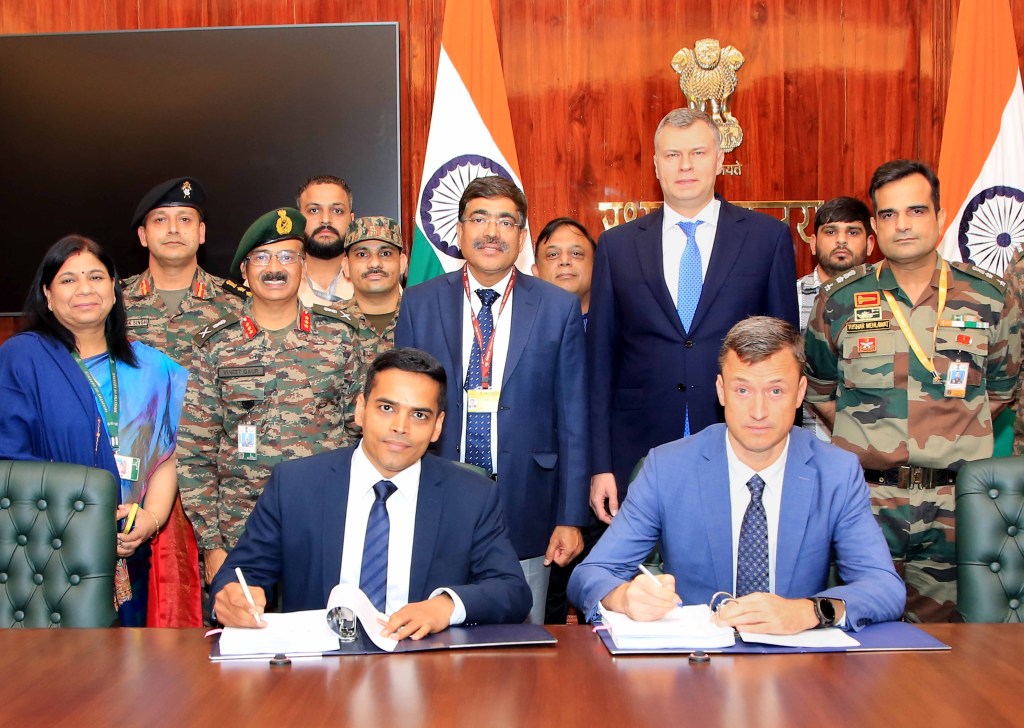The Indian Ministry of Defence (MoD) has signed a significant contract with Russia’s Rosoboronexport (RoE) worth $248 million to procure new 1000 horsepower (HP) engines for the Indian Army’s fleet of T-72 tanks. This deal includes the supply of engines in various conditions—fully assembled, semi-knocked down, and completely knocked down—ensuring that India’s defence capabilities are enhanced while also promoting the domestic manufacturing of these engines.
According to an official statement issued by the Ministry of Defence on March 7, 2025, as part of the agreement, technology transfer (ToT) will be provided to Armoured Vehicles Nigam Limited (AVNL), located in Avadi, Tamil Nadu, a state-owned enterprise that is part of the Heavy Vehicle Factory (HVF). Also, this initiative will allow for the integration and licensed production of these engines in India, directly contributing to the country’s goal of achieving greater self-reliance in defence manufacturing under the “Make in India” program.
Strengthening Indigenous Capabilities
FinancialExpress.com has previously reported earlier that the T-72 tanks, which have been the backbone of India’s armoured forces for decades, are currently equipped with 780 HP engines. With the new 1000 HP engines, the T-72 fleet will see a significant upgrade in mobility, providing enhanced operational capability in diverse combat scenarios. This move also aligns with India’s broader objective of reducing dependence on foreign suppliers and boosting indigenous defence production, especially as the country seeks to modernize its military infrastructure.
AVNL, the key player in this initiative, will spearhead the production of these engines in India, marking a step forward in India’s defence sector modernization. By manufacturing these engines domestically, India aims to foster a self-sustaining ecosystem for its defence needs, ensuring long-term operational readiness without the complexities of foreign supply chain dependencies.
T-72 Tanks: A Symbol of Endurance and Innovation
The T-72, a Soviet-era tank, has undergone multiple upgrades to remain relevant in contemporary military operations. Though it was introduced in the 1970s, the T-72 continues to serve as a key component of India’s tank fleet. The latest iterations, such as the CI-Ajeya, feature modern enhancements, including Explosive Reactive Armour (ERA), GPS systems, and advanced fire detection technologies, which increase the tank’s battlefield effectiveness.
One of the extraordinary capabilities of the T-72 is its ability to cross rivers using a snorkel system, a feature that offers unparalleled operational flexibility in challenging terrains. However, such capabilities also carry inherent risks, as demonstrated by a tragic incident in Ladakh, where a T-72 tank sank during a river-crossing exercise due to flash floods, resulting in the loss of five soldiers.
A Shift Toward Self-Reliance in Defence
The Indian Army is taking proactive steps to reduce its dependence on Russian-made components. In 2024, the army issued a request for information (RFI) from both public sector undertakings (PSUs) and private defence companies to overhaul and extend the service life of its T-72 tanks. This is driven by both the desire to modernize and to circumvent the challenges posed by the ongoing Russia-Ukraine conflict, which has disrupted supply chains.
The focus of these efforts is to overhaul and upgrade the T-72 fleet with new systems and domestically manufactured components. These enhancements will restore the tanks to a “like-new” condition, ensuring they continue to meet the Army’s operational requirements. Overhauls will include the replacement of key systems and parts, with warranties provided to ensure operational reliability.
Future Prospects for India’s T-72 Fleet
The signing of this deal marks a critical moment in India’s efforts to modernize its military hardware while simultaneously building up its defence manufacturing capabilities. Through strategic technology transfers and domestic production, India is positioning itself as a self-reliant military power with an indigenous defence industry capable of meeting its own needs.
As the Indian Army works towards the overhaul and upgrade of its fleet, including the integration of the new engines, the T-72 will continue to play a critical role in safeguarding national security. This initiative is not only about technological advancement but also about reinforcing India’s position as a global player in defence production and military innovation.


